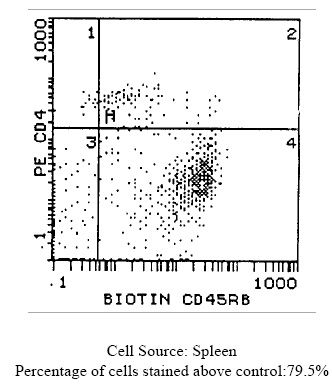CD45 / LCA (CD45RB) Rat Monoclonal Antibody [Clone ID: 16A]
Specifications
| Product Data | |
| Clone Name | 16A |
| Applications | FC |
| Recommended Dilution | Flow cytometry. Immunohistochemistry on acetone-fixed frozen sections and paraffin embedded sections. Immunoprecipitation. |
| Reactivities | Mouse |
| Host | Rat |
| Isotype | IgG2a |
| Clonality | Monoclonal |
| Immunogen | TH2 cell clones, final boost with TH2 clone D10 Fusion Partner: Ag8.653 |
| Specificity | This monoclonal antibody reacts with the CD45 isoform containing the exon B dependent epitope. CD45RB is highly expressed on peripheral B cells, cytotoxic T cells, a subset of T helper cells and most thymoctyes. |
| Formulation | PBS, 0.02% NaN3 and EIA grade BSA as a stabilizing protein to bring total protein concentration to 4-5 mg/ml Label: Biotin State: Liquid |
| Concentration | 0.1 mg/ml |
| Purification | Protein G Chromatography |
| Conjugation | Biotin |
| Background | CD45 is a family of single chain transmembraneous glycoproteins consisting of at least four isoforms (220, 205, 190, 180 kDa) which share a common large intracellular domain. Their extracellular domains are heavily glycosylated. The different isoforms are produced by alternative messenger RNA splicing of three exons of a single gene on chromosome 1. CD45 is expressed on cells of the human hematopoietic lineage (including hematopoietic stem cells) with the exception of mature red cells. It is not detected on differentiated cells of other tissues. It is likely that CD45 plays an important role in signal transduction, inhibition or upregulation of various immunological functions. Antibodies recognising a common epitope on all of the isoforms are termed CD45 whilst those recognising only individual isoforms are termed CD45RA or CD45RO etc. |
| Synonyms | PTPRC, Leukocyte common antigen, L-CA, T200 |
| Note | Protocol: FLOW CYTOMETRY ANALYSIS: Method: 1. Prepare a cell suspension in media A. For cell preparations, deplete the red blood cell population with Lympholyte®-M cell separation medium. 2. Wash 2 times. 3. Resuspend the cells to a concentration of 2x10e7 cells/ml in media A. Add 50 µl of this suspension to each tube (each tube will then contain 1 x 10e6 cells, representing 1 test). 4. To each tube, add 1.0 µg* of this Ab per 10e6 cells. 5. Vortex the tubes to ensure thorough mixing of antibody and cells. 6. Incubate the tubes for 30 minutes at 4°C. (It is recommended that the tubes are protected from light, since most fluorochromes are light sensitive.) 7. Wash 2 times at 4°C. 8. Add 100 µl of secondary antibody (Streptavidin-FITC) at a 1:500 dilution. 9. Incubate tubes at 4°C for 30 - 60 minutes (10. Wash 2 times at 4°C. 11. Resuspend the cell pellet in 50 µl ice cold media B. 12. Transfer to suitable tubes for flow cytometric analysis containing 15 µl of propidium iodide at 0.5 mg/ml in PBS. This stains dead cells by intercalating in DNA. Media: A. Phosphate buffered saline (pH 7.2) + 5% normal serum of host species + sodium azide (100 µl of 2M sodium azide in 100 mls). B. Phosphate buffered saline (pH 7.2) + 0.5% Bovine serum albumin + sodium azide (100 µl of 2M sodium azide in 100 mls). Results - Tissue Distribution: Mouse Strain: BALB/c Cell Concentration: 1x10e6 cells per test Antibody Concentration Used: 1.0 µg/10e6 cells Isotypic Control: Biotin Rat IgG2a |
| Reference Data | |
Documents
| Product Manuals |
| FAQs |
| SDS |
{0} Product Review(s)
0 Product Review(s)
Submit review
Be the first one to submit a review
Product Citations
*Delivery time may vary from web posted schedule. Occasional delays may occur due to unforeseen
complexities in the preparation of your product. International customers may expect an additional 1-2 weeks
in shipping.






























































































































































































































































 Germany
Germany
 Japan
Japan
 United Kingdom
United Kingdom
 China
China



